

Are You Disorganized? Research Says That’s a Good Thing. In Where Good Ideas Come From: The Natural History of Innovation, Steven Johnson posits that “the more disorganized your brain is, the smarter you are” in reference to the results of a neuroscience experiment by Robert Thatcher.
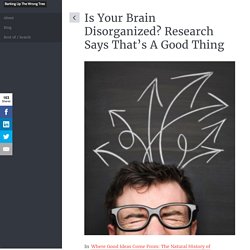
Across the board, in Johnson’s book and other sources it seems pretty clear that creativity is messy. Ideas need to be sloshing around or crashing in to one another to produce breakthroughs: Johnson cites research showing that the volume of ideas bouncing about make large cities disproportionately more creative than smaller towns.Having multiple hobbies allows your brain to subconsciously compare and contrast problems and solutions, forming new connections at the margins of each.Similarly, reading multiple books at the same time vs serially lets your brain juxtapose new ideas and develop new connections.Wandering minds are more creative.Studying a field “too much” doesn’t limit creativity — it does the opposite.
At the end of his book Johnson recommends: Creating Readers: A Case Against Extrinsic Rewards. ASCD Express 11.01 - Providing Space for Wonder: Fostering Children’s Natural Sense of Inquiry. Providing Space for Wonder: Fostering Children's Natural Sense of Inquiry.
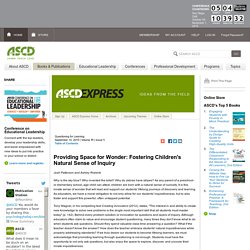
Why America’s obsession with STEM education is dangerous. If Americans are united in any conviction these days, it is that we urgently need to shift the country’s education toward the teaching of specific, technical skills.

Every month, it seems, we hear about our children’s bad test scores in math and science — and about new initiatives from companies, universities or foundations to expand STEM courses (science, technology, engineering and math) and deemphasize the humanities. From President Obama on down, public officials have cautioned against pursuing degrees like art history, which are seen as expensive luxuries in today’s world.
Republicans want to go several steps further and defund these kinds of majors. “Is it a vital interest of the state to have more anthropologists?” Asked Florida’s Gov. This dismissal of broad-based learning, however, comes from a fundamental misreading of the facts — and puts America on a dangerously narrow path for the future. ROLE « MyCourseRoom. Communication is critical in conflict management, and much of the communication is done by non-verbal means.
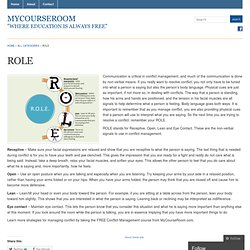
If you really want to resolve conflict, you not only have to be tuned into what a person is saying but also the person’s body language. Physical cues are just as important, if not more so, in dealing with conflicts. The way that a person is standing, how his arms and hands are positioned, and the tension in his facial muscles are all signals to help determine what a person is feeling.
Body language goes both ways. It is important to remember that as you manage conflict, you are also providing physical cues that a person will use to interpret what you are saying. ROLE stands for Receptive, Open, Lean and Eye Contact. Receptive – Make sure your facial expressions are relaxed and show that you are receptive to what the person is saying.
Open – Use an open posture when you are talking and especially when you are listening. Eye contact – Maintain eye contact. And How Kids Can Wear Them Safely. Between studying, homework and extracurricular activities, going back to school may make kids feel like they have the weight of the world on their shoulders.
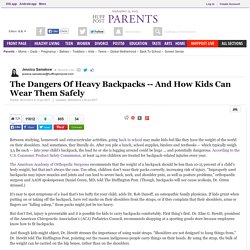
And sometimes, they literally do. After you pile a lunch, school supplies, binders and textbooks -- which typically weigh 3.5 lbs each -- into your child's backpack, the load he or she is lugging around could be huge ... and potentially dangerous. According to the U.S. Consumer Product Safety Commission, at least 14,000 children are treated for backpack-related injuries every year. The American Academy of Orthopedic Surgeons recommends that the weight of a backpack should be less than 10-15 percent of a child’s body weight, but that isn't always the case.
It's easy to spot symptoms of a load that's too hefty for your child, adds Dr. But don't fret, injury is preventable and it is possible for kids to carry backpacks comfortably. And though kids might object, Dr. Music Lessons Enhance Brain Function in Disadvantaged Kids. Children from poor neighborhoods in Los Angeles who took regular music lessons for two years were able to distinguish similar speech sounds faster than their peers.
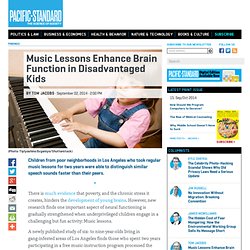
There is much evidence that poverty, and the chronic stress it creates, hinders the development of young brains. However, new research finds one important aspect of neural functioning is gradually strengthened when underprivileged children engage in a challenging but fun activity: Music lessons. A newly published study of six- to nine-year-olds living in gang-infested areas of Los Angeles finds those who spent two years participating in a free music-instruction program processed the sound of certain syllables more rapidly than their peers with less musical training.
“This research demonstrates that community music programs can literally remodel children’s brains in a way that improves sound processing, which could lead to better learning and language skills.” Kraus and her colleagues followed 44 children for three years.